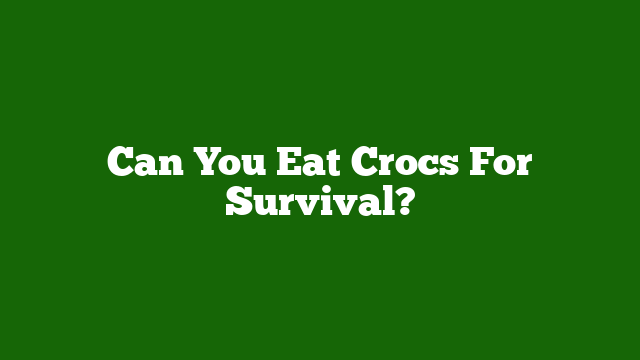Last Updated on June 12, 2023 by Umar
Crocodile meat has been gaining popularity as a source of protein, especially in countries where the reptiles are farmed.
This comprehensive blog post will explore the nutritional value, health benefits, and potential risks of consuming crocodile meat, as well as provide tips on how to prepare and cook it safely.
So, let’s dive into the world of crocodile meat and find out if it’s a viable option for survival.
Nutritional Value of Crocodile Meat
Crocodile meat is low in calories and fat, making it a healthier alternative to other meats like pork.
A serving of crocodile meat contains 99 kilocalories (kcal), 21.5 grams (g) of protein, 2.9g of fat, and 65 milligrams (mg) of cholesterol
In comparison, pork has 107 kcal, 22g of protein, 2g of fat, and 22mg of cholesterol
Crocodile meat is also a good source of essential amino acids and Omega-3 fatty acids.
Health Benefits of Crocodile Meat
Consuming crocodile meat can provide several health benefits, including:
- A lean source of protein: Crocodile meat is high in protein, making it an excellent option for those looking to build muscle or maintain a healthy weight.
- Low in fat: With only 2.9g of fat per serving, crocodile meat is a healthier alternative to other meats with higher fat content.
- Rich in Omega-3 fatty acids: These fatty acids are essential for maintaining heart health and reducing inflammation.
Potential Health Risks
While crocodile meat is generally considered safe to eat when properly prepared and cooked, there are some potential health risks to be aware of:
- Bacterial contamination: Crocodiles are classified as reptiles, and their meat could be contaminated with bacteria such as salmonella, which could cause diseases like typhoid, diarrhea, and digestive disorders.
- Allergic reactions: Some individuals with fish allergies may also be allergic to crocodile meat, so it’s essential to confirm tolerance with a medical professional before consumption.
Preparing and Cooking Crocodile Meat
To ensure the safe consumption of crocodile meat, follow these tips:
- Purchase from a reputable source: Make sure to buy crocodile meat from a reliable source that has inspected the animal for any potential contaminants.
- Choose the right cut: The tail meat (bong ton) is considered the best part of the crocodile to consume.
- Cook from frozen: Crocodile meat is best cooked from frozen, as thawing can cause a loss of moisture and flavor.
- Cook for two minutes on each side: Cook the meat for two minutes on either side and then let it rest for a few minutes before serving. It should be served just cooked (medium-rare in red meat terms) .
- Practice good hygiene: Wash hands and equipment thoroughly before and after handling crocodile meat to avoid bacterial contamination.
Crocodile Meat in Survival Situations
In a survival situation, crocodile meat can be a valuable source of protein and nutrients.
However, it’s essential to take the necessary precautions when preparing and cooking the meat to avoid potential health risks.
It’s also crucial to remember that this blog post refers to actual crocodile meat, not the popular Crocs footwear.
Consuming Crocs shoes is not recommended, as they have no nutritional value and could lead to stomach issues
.
Conclusion
Crocodile meat can be a nutritious and delicious alternative to other meats, offering a lean source of protein and essential nutrients.
However, it’s essential to be aware of potential health risks and take the necessary precautions when preparing and cooking crocodile meat.
In a survival situation, crocodile meat can be a valuable source of sustenance, but always prioritize safety and proper food handling practices.
Helpful Resources
- https://www.thaipbsworld.com/not-a-lot-of-croc-crocodile-meat-is-edible-when-its-cooked-well/
- https://vetshows.com/crocodile-meat/
- https://www.nationthailand.com/blogs/in-focus/40011289
- https://www.jcu.edu.au/news/releases/2022/may/croc-meat-may-be-unsafe-for-fish-allergy-sufferers
- https://www.taphibians.com/can-you-get-sick-from-eating-crocodile/
- https://mrbarra.com/crocodile/
- https://coralfarms.com.ph/index.php?controller=cms&id_cms=9
- https://1075theriver.iheart.com/featured/jonathan/content/2022-09-22-can-you-eat-your-crocs-to-survive/
- https://www.americantop40.com/alternate/amp/2022-09-22-can-you-eat-your-crocs-to-survive/

